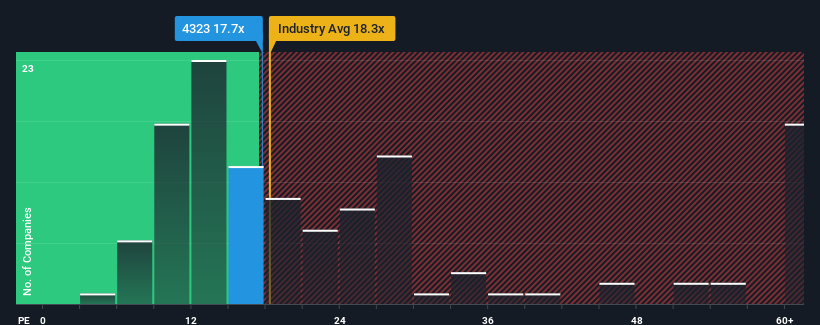Japan System Techniques Co., Ltd. (TSE:4323) Not Lagging Market On Growth Or Pricing
When close to half the companies in Japan have price-to-earnings ratios (or "P/E's") below 11x, you may consider Japan System Techniques Co., Ltd. (TSE:4323) as a stock to avoid entirely with its 17.7x P/E ratio. Nonetheless, we'd need to dig a little deeper to determine if there is a rational basis for the highly elevated P/E.
Earnings have risen firmly for Japan System Techniques recently, which is pleasing to see. One possibility is that the P/E is high because investors think this respectable earnings growth will be enough to outperform the broader market in the near future. You'd really hope so, otherwise you're paying a pretty hefty price for no particular reason.
Check out our latest analysis for Japan System Techniques

How Is Japan System Techniques' Growth Trending?
The only time you'd be truly comfortable seeing a P/E as steep as Japan System Techniques' is when the company's growth is on track to outshine the market decidedly.
Taking a look back first, we see that the company grew earnings per share by an impressive 18% last year. The latest three year period has also seen an excellent 216% overall rise in EPS, aided by its short-term performance. So we can start by confirming that the company has done a great job of growing earnings over that time.
Weighing that recent medium-term earnings trajectory against the broader market's one-year forecast for expansion of 9.9% shows it's noticeably more attractive on an annualised basis.
With this information, we can see why Japan System Techniques is trading at such a high P/E compared to the market. Presumably shareholders aren't keen to offload something they believe will continue to outmanoeuvre the bourse.
What We Can Learn From Japan System Techniques' P/E?
Generally, our preference is to limit the use of the price-to-earnings ratio to establishing what the market thinks about the overall health of a company.
As we suspected, our examination of Japan System Techniques revealed its three-year earnings trends are contributing to its high P/E, given they look better than current market expectations. At this stage investors feel the potential for a deterioration in earnings isn't great enough to justify a lower P/E ratio. Unless the recent medium-term conditions change, they will continue to provide strong support to the share price.
Don't forget that there may be other risks. For instance, we've identified 1 warning sign for Japan System Techniques that you should be aware of.
If these risks are making you reconsider your opinion on Japan System Techniques, explore our interactive list of high quality stocks to get an idea of what else is out there.
New: Manage All Your Stock Portfolios in One Place
We've created the ultimate portfolio companion for stock investors, and it's free.
• Connect an unlimited number of Portfolios and see your total in one currency
• Be alerted to new Warning Signs or Risks via email or mobile
• Track the Fair Value of your stocks
Have feedback on this article? Concerned about the content? Get in touch with us directly. Alternatively, email editorial-team (at) simplywallst.com.
This article by Simply Wall St is general in nature. We provide commentary based on historical data and analyst forecasts only using an unbiased methodology and our articles are not intended to be financial advice. It does not constitute a recommendation to buy or sell any stock, and does not take account of your objectives, or your financial situation. We aim to bring you long-term focused analysis driven by fundamental data. Note that our analysis may not factor in the latest price-sensitive company announcements or qualitative material. Simply Wall St has no position in any stocks mentioned.
Have feedback on this article? Concerned about the content? Get in touch with us directly. Alternatively, email editorial-team@simplywallst.com
About TSE:4323
Japan System Techniques
Engages in the software business in Japan and internationally.
Flawless balance sheet with solid track record and pays a dividend.
Market Insights
Community Narratives



